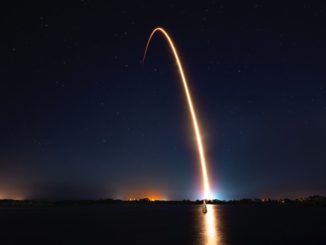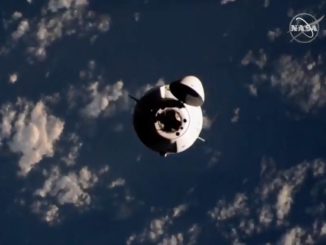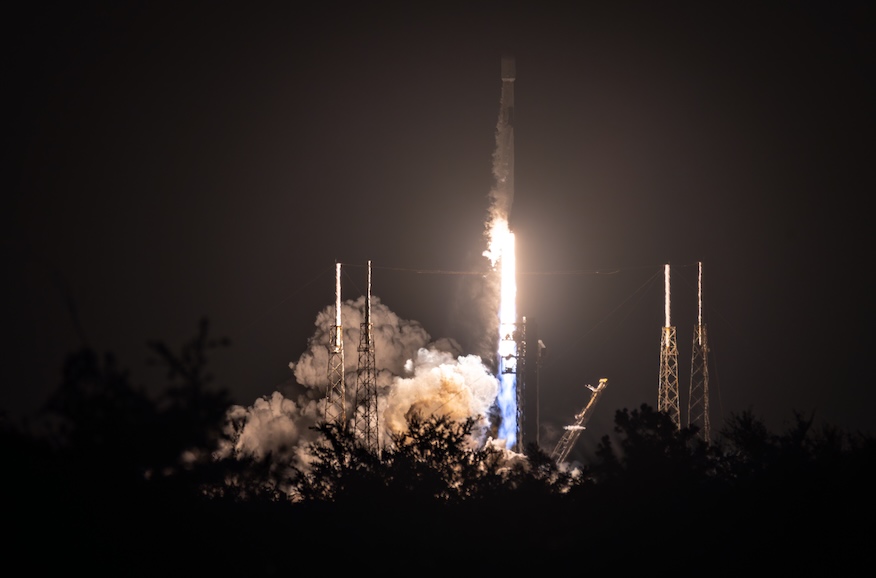
Update July 16, 2:53 a.m. EDT: The Falcon 9 booster landed on the droneship.
Amazon now has the third launch of its Project Kuiper broadband internet satellites in the books. This time around, they launched on a SpaceX Falcon 9 rocket.
The mission, dubbed KF-01 or Kuiper Falcon 1, lifted off at 2:30 a.m. EDT (0630 UTC). The rocket took off from Space Launch Complex 40 at Cape Canaveral Space Force Station and will begin deploying the 24 Project Kuiper satellites about 56 minutes after liftoff.
SpaceX used the Falcon 9 first stage booster with the tail number B1096 to launch the mission, which flew for its first time. About 8.5 minutes after liftoff, landed on the droneship, ‘A Shortfall of Gravitas.’
This was the 118th landing on this vessel and the 476th booster landing to date.
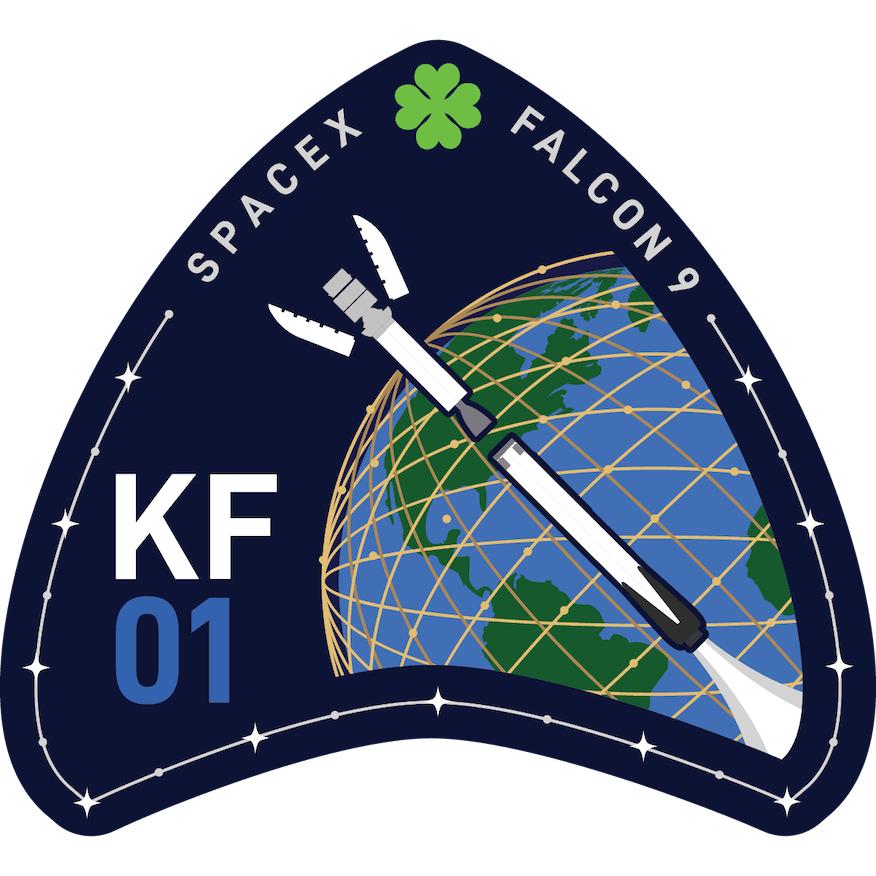
Ramping up cadence
The launch set for the predawn hours of Wednesday will the the third time Amazon sends its satellites into low Earth orbit. This follows a pair of launches on Atlas 5 rockets from United Launch Alliance that each had 27 satellites onboard each.
The successful deployment at the conclusion of the KF-01 mission brings Amazon up to 78 satellites on orbit. The Federal Communications Commission requires Amazon to have at least 50 percent of its planned 3,236-satellite constellation in operation no later than July 30, 2026.
In a statement, Amazon said the 24 satellites were released from the Falcon 9 rocket into a 289-mile (465-km) high orbit. Kuiper ground controllers in Redmond, Washington, planned to perform initial health checks of the the satellites before starting operations to raised their orbits to about 391 miles (630 km) high.
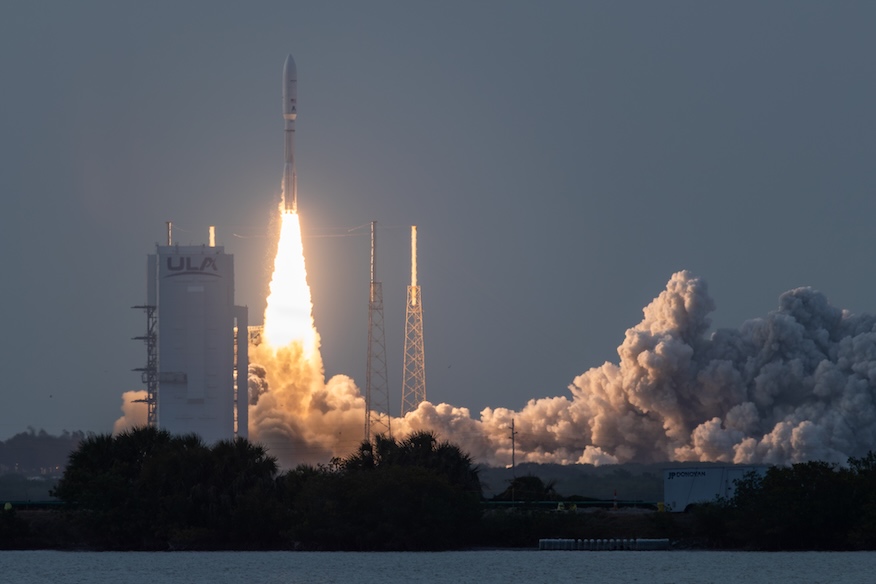
Amazon’s first batch of launches were purchased in 2021 when it announced that it secured nine dedicated flights using ULA’s Atlas 5 rocket. In April 2022, it followed up with the announcement of the at least 68 launches onboard three different rockets.
The tech giant bought 38 flights onboard ULA’s Vulcan rocket, 18 on Arianespace’s Ariane 6 rocket and at least 12 using Blue Origin’s New Glenn. Amazon purchased the option of adding 15 additional New Glenn launches, as well.
Notably absent in the launch lineup was the company with the highest launch rate: SpaceX. At the time Amazon announced its massive launch space purchase on April 5, 2022, SpaceX achieved 31 launches in 2021 and 11 so far in 2022.
Comparatively, in that same timeframe, ULA had launched twice by April 2022 and five times in all of 2021. For context though, both its Delta 4 and Atlas 5 rockets were in the process of being phased out ahead of Vulcan’s introduction and it only had a finite number of missions it could perform.
Amazon investors pushed back against the idea of launching the Project Kuiper constellation without using SpaceX’s Falcon 9 rockets. A lawsuit was filed in August 2023 arguing that Amazon Founder Jeff Bezos’s personal feelings about Elon Musk superseded everything else when it came to purchasing launch capacity for the Project Kuiper satellite constellation.
The suit claimed that Bezos and Amazon CEO Andy Jassy “consciously and intentionally breached their most basic fiduciary responsibilities” by not selecting any launches that used the Falcon 9 rocket. It added that the company’s leaders “excluded the most obvious and affordable launch provider, SpaceX, from its procurement process because of Bezos’ personal rivalry with Musk.”
Amazon denied these claims, telling CNBC in September 2023 that “The claims in this lawsuit are completely without merit.”

A few months later though, Amazon announced in a December 2023 press release that it signed a launch contract with SpaceX to fly batches of its Project Kuiper satellites on three of its Falcon 9 rockets. At the time, Amazon said those missions would begin flying in mid-2025.
“Our earlier procurement of 77 heavy-lift rockets from Arianespace, Blue Origin, and United Launch Alliance (ULA) provides enough capacity to launch the majority of our satellite constellation, and the additional launches with SpaceX offer even more capacity to support our deployment schedule,” Amazon said in a statement at the time.
It’s not clear when Arianespace or Blue Origin will begin launching Kuiper satellites. So far, there have only been two launches of an Ariane 6 rocket and one New Glenn.
Ariancespace’s next flight is scheduled for August with a satellite from EUMETSAT and Blue Origin hasn’t announced what its next payload will be or exactly when it will launch.
ULA meanwhile plans to launch its first batch of 45 Kuiper satellites on a Vulcan rocket sometime in the back half of 2025, after it launches a pair of national security payloads, beginning with the USSF-106 mission.

